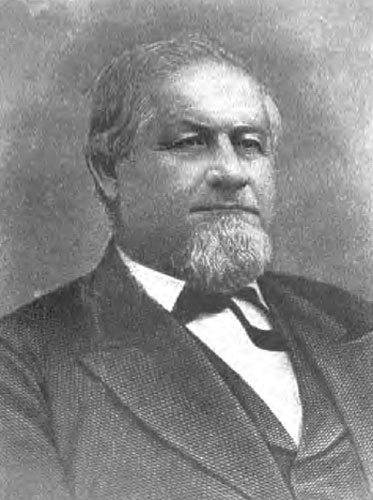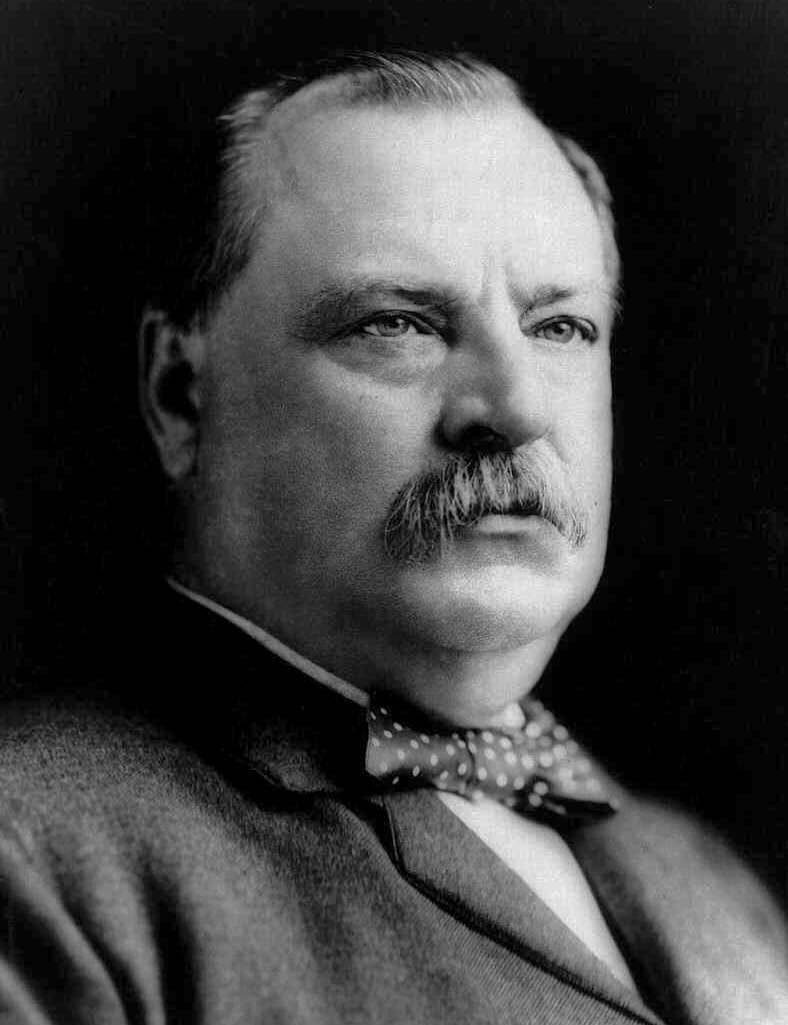|
John M. Palmer
John McAuley Palmer (September 13, 1817September 25, 1900) was an American politician. He was an Illinois resident, a general who fought for the Union during the American Civil War, the 15th governor of Illinois, and presidential candidate of the National Democratic Party in the 1896 election on a platform to defend the gold standard, free trade, and limited government. Palmer switched political parties throughout his life, starting a Democrat. He became in turn an anti-Nebraska Democrat (an anti-slavery opponent of the Kansas-Nebraska Act), a Republican, a Liberal Republican, returned to being a Democrat, then ended as a Bourbon Democrat. He said, "I had my own views. I was not a slave of any party," and added, "I thought for myself and avespoken my own words on all occasions." Early life and career Born at Eagle Creek in Scott County, Kentucky, Palmer's family moved to Alton, Illinois, in 1831. They were very poor, but he later worked his way through college. In 1839 ... [...More Info...] [...Related Items...] OR: [Wikipedia] [Google] [Baidu] |
Illinois
Illinois ( ) is a U.S. state, state in the Midwestern United States, Midwestern United States. It borders on Lake Michigan to its northeast, the Mississippi River to its west, and the Wabash River, Wabash and Ohio River, Ohio rivers to its south. Of the fifty U.S. states, Illinois has the List of U.S. states and territories by GDP, fifth-largest gross domestic product (GDP), the List of U.S. states and territories by population, sixth-largest population, and the List of U.S. states and territories by area, 25th-most land area. Its capital city is Springfield, Illinois, Springfield in the center of the state, and the state's largest city is Chicago in the northeast. Present-day Illinois was inhabited by Indigenous peoples of the Americas#History, Indigenous cultures for thousands of years. The French were the first Europeans to arrive, settling near the Mississippi and Illinois River, Illinois rivers in the 17th century Illinois Country, as part of their sprawling colony of ... [...More Info...] [...Related Items...] OR: [Wikipedia] [Google] [Baidu] |
Eagle Creek (Kentucky)
Eagle Creek is a long meandering stream running through several counties in central Kentucky in the United States. It is a tributary of the Kentucky River, the confluence of which is near Worthville in Carroll County. Features See also *List of rivers of Kentucky List of rivers in Kentucky (U.S. state). By drainage basin This list is arranged by drainage basin, with respective tributaries indented under each larger stream's name. All rivers in Kentucky flow to the Mississippi River, nearly all by virtue o ... References Rivers of Kentucky Wild and Scenic Rivers of the United States Rivers of Carroll County, Kentucky Rivers of Owen County, Kentucky Rivers of Gallatin County, Kentucky Rivers of Scott County, Kentucky Rivers of Grant County, Kentucky {{Kentucky-river-stub ... [...More Info...] [...Related Items...] OR: [Wikipedia] [Google] [Baidu] |
Bourbon Democrat
Bourbon Democrat was a term used in the United States in the later 19th century and early 20th century (1872–1904) to refer to members of the Democratic Party who were ideologically aligned with fiscal conservatism or classical liberalism, especially those who supported presidential candidates Charles O'Conor in 1872, Samuel J. Tilden in 1876, President Grover Cleveland in 1884, 1888, and 1892 and Alton B. Parker in 1904. Bourbon Democrats were promoters of a form of ''laissez-faire'' capitalism which included opposition to the high-tariff protectionism that the Republicans were then advocating as well as fiscal discipline. They represented business interests, generally supporting the goals of banking and railroads, but opposing subsidies and trade protectionism. They opposed American imperialism and overseas expansion, fought for the gold standard against bimetallism, and promoted what they called "hard" and "sound" money. Strong supporters of states' rights and reform mov ... [...More Info...] [...Related Items...] OR: [Wikipedia] [Google] [Baidu] |
Abolitionism In The United States
In the United States, abolitionism, the movement that sought to end slavery in the United States, slavery in the country, was active from the Colonial history of the United States, colonial era until the American Civil War, the end of which brought about the abolition of American slavery, Penal labor in the United States, except as punishment for a crime, through the Thirteenth Amendment to the United States Constitution (ratified 1865). The anti-slavery movement originated during the Age of Enlightenment, focused on ending the Atlantic slave trade, transatlantic slave trade. In Colonial America, a few German Quakers issued the 1688 Germantown Quaker Petition Against Slavery, which marked the beginning of the American abolitionist movement. Before the American Revolutionary War, Revolutionary War, Evangelicalism in the United States, evangelical colonists were the primary advocates for the opposition to Slavery in the colonial United States, slavery and the slave trade, doing ... [...More Info...] [...Related Items...] OR: [Wikipedia] [Google] [Baidu] |
Nebraska Territory
The Territory of Nebraska was an organized incorporated territory of the United States that existed from May 30, 1854, until March 1, 1867, when the final extent of the territory was admitted to the Union as the state of Nebraska. The Nebraska Territory was created by the Kansas–Nebraska Act of 1854. The territorial capital was Omaha. The territory encompassed areas of what is today Nebraska, Wyoming, South Dakota, North Dakota, Colorado, and Montana. History An enabling act was passed by the Congress of the United States in 1864. Delegates for a constitutional convention were elected; this convention did not produce a constitution. Two years later, in 1866, a constitution was drafted and voted upon. It was approved by 100 votes. However, a clause in this constitution that limited suffrage to "free white males" delayed Nebraska's entry into the Union for almost a year. The 1866 enabling act for the state was subject to a pocket veto by Democratic Party / War Democrat ... [...More Info...] [...Related Items...] OR: [Wikipedia] [Google] [Baidu] |
Free Trade
Free trade is a trade policy that does not restrict imports or exports. In government, free trade is predominantly advocated by political parties that hold Economic liberalism, economically liberal positions, while economic nationalist political parties generally support protectionism, the opposite of free trade. Most nations are today members of the World Trade Organization multilateral trade agreements. States can unilaterally reduce regulations and duties on imports and exports, as well as form bilateral and multilateral free trade agreements. Free trade areas between groups of countries, such as the European Economic Area and the Mercosur open markets, establish a free trade zone among members while creating a protectionist barrier between that free trade area and the rest of the world. Most governments still impose some protectionist policies that are intended to support local employment, such as applying tariffs to imports or Subsidy, subsidies to exports. Governments may ... [...More Info...] [...Related Items...] OR: [Wikipedia] [Google] [Baidu] |
Gold Standard
A gold standard is a backed currency, monetary system in which the standard economics, economic unit of account is based on a fixed quantity of gold. The gold standard was the basis for the international monetary system from the 1870s to the early 1920s, and from the late 1920s to 1932 as well as from 1944 until 1971 when the United States unilaterally terminated convertibility of the US dollar to gold, effectively ending the Bretton Woods system. Many states nonetheless hold substantial gold reserves. Historically, the silver standard and bimetallism have been more common than the gold standard. The shift to an international monetary system based on a gold standard reflected accident, network externalities, and path dependence. Great Britain accidentally adopted a ''de facto'' gold standard in 1717 when Isaac Newton, then-master of the Royal Mint, set the exchange rate of silver to gold too low, thus causing silver coins to go out of circulation. As Great Britain became the w ... [...More Info...] [...Related Items...] OR: [Wikipedia] [Google] [Baidu] |
1896 United States Presidential Election
Presidential elections were held in the United States on November 3, 1896. Former Governor William McKinley, the Republican nominee, defeated former Representative William Jennings Bryan, the Democratic nominee. The 1896 campaign, which took place during an economic depression known as the Panic of 1893, was a political realignment that ended the old Third Party System and began the Fourth Party System. Incumbent Democratic President Grover Cleveland did not seek election to a second consecutive term (which would have been his third overall), leaving the Democratic nomination open. An attorney and former congressman, Bryan galvanized support with his Cross of Gold speech, which called for reform of the monetary system and attacked business leaders as the cause of ongoing economic depression. The 1896 Democratic National Convention repudiated the Cleveland administration and nominated Bryan on the fifth presidential ballot. Bryan then won the nomination of the Populist Pa ... [...More Info...] [...Related Items...] OR: [Wikipedia] [Google] [Baidu] |
List Of Governors Of Illinois
The governor of Illinois is the head of government of the U.S. state of Illinois. The governor is the head of the executive branch of Illinois's state government and is charged with enforcing state laws. The governor has the power to either approve or veto bills passed by the Illinois Legislature, to convene the legislature, and to grant pardons, except in cases of impeachment. The governor is also the commander-in-chief of the state's military forces. Since becoming a state in 1818, 43 people have served as governor of Illinois; before statehood, it had only one territorial governor, Ninian Edwards. The longest-serving governor was James R. Thompson, who was elected to four terms lasting 14 years, from 1977 to 1991. Only one governor, Richard J. Oglesby, has served multiple non-consecutive terms, having been elected in 1864, 1872, and 1884. The current governor is J. B. Pritzker, who took office on January 14, 2019. List of governors Territory of Illinois Illinois Terri ... [...More Info...] [...Related Items...] OR: [Wikipedia] [Google] [Baidu] |
General Officer
A general officer is an Officer (armed forces), officer of high rank in the army, armies, and in some nations' air force, air and space forces, marines or naval infantry. In some usages, the term "general officer" refers to a rank above colonel."general, adj. and n.". OED Online. March 2021. Oxford University Press. https://www.oed.com/view/Entry/77489?rskey=dCKrg4&result=1 (accessed May 11, 2021) The adjective ''general'' had been affixed to officer designations since the late medieval period to indicate relative superiority or an extended jurisdiction. French Revolutionary system Arab system Other variations Other nomenclatures for general officers include the titles and ranks: * Adjutant general * Commandant-General, Commandant-general * Inspector general * General-in-chief * General of the Air Force (USAF only) * General of the Armies, General of the Armies of the United States (of America), a title created for General John J. Pershing, and subsequently grante ... [...More Info...] [...Related Items...] OR: [Wikipedia] [Google] [Baidu] |







